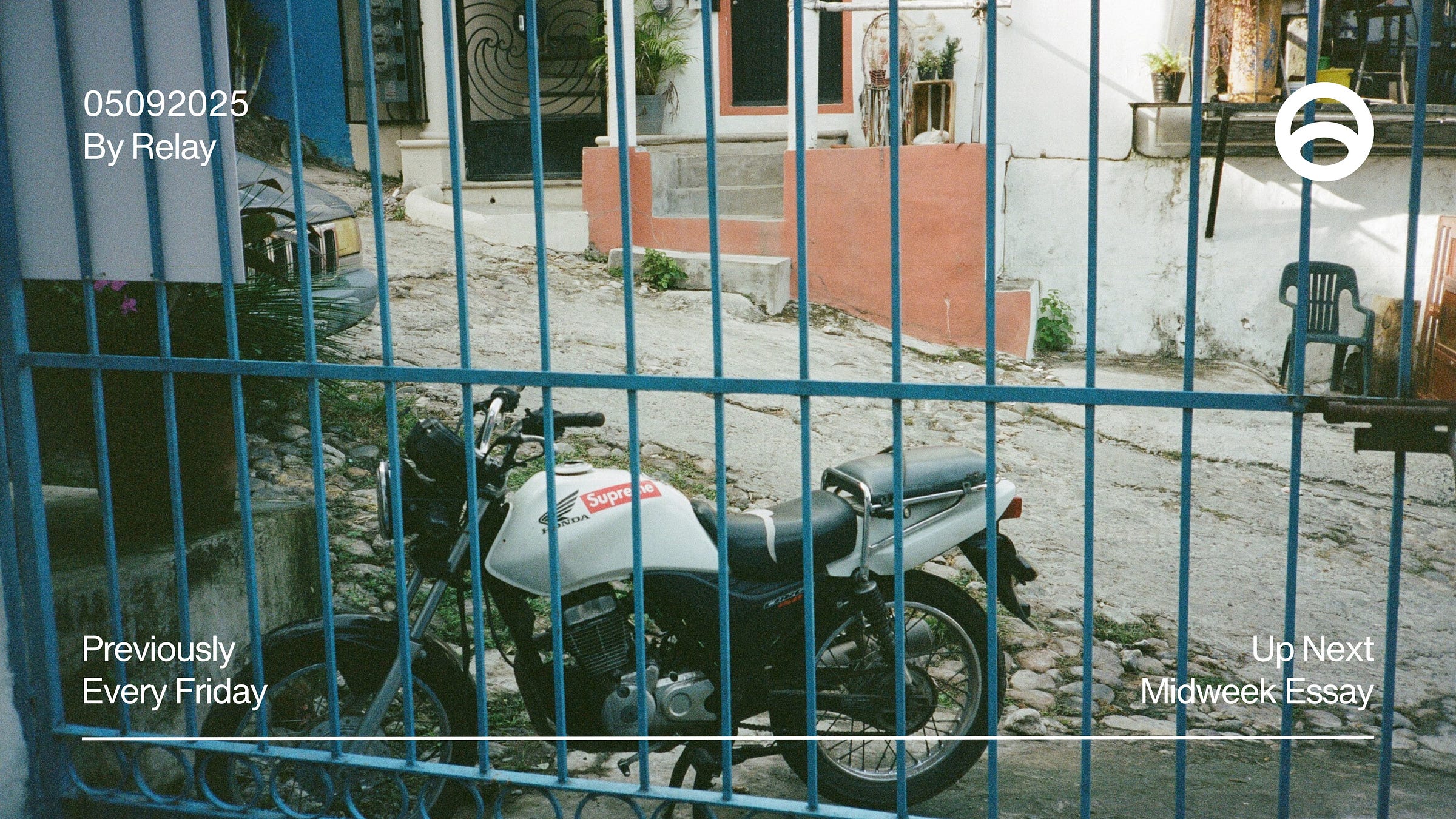Every Friday
you’re probably doing better than you think
We regret to inform you: the monoculture is back. For a few days at least, it felt like every screen in every timezone was showing the same handful of images: celebrities trying not to get canceled by fumbling the Met theme, papal robes, and grainy footage of things on fire.
In an internet built for infinite niche content, moments like this feel almost suspicious. Like… why are we all talking about the same things again? But maybe it makes sense. After years of “you might also like,” it’s oddly comforting to remember that sometimes, we all like.
That said, monoculture’s not the only culture. So this week, we’re popping the bubble and rounding up the best of what got buried under Vatican live feeds and red carpet discourse.
Let’s get into it.
If you’re explaining, you’re losing.
— Ronald Reagan
I believe that if you are a young person and you're not representative of your government - if you're a left-leaning person in an oppressive place - the only common understanding you're going to get is through art and culture.
— Matty Healy
Top of Mind
Facebook Allegedly Detected When Teen Girls Deleted Selfies So It Could Serve Them Beauty Ads (Futurism)
As the philosopher Antonio Gramsci wrote from his prison cell in Fascist Italy: "The old world is dying and the new world struggles to be born. Now is the time of monsters."
By exploiting moments of vulnerability, allegedly, Facebook turns adolescent insecurity into a monetizable event, echoing Orwellian themes of pervasive monitoring and psychological control. This strategy not only commodifies self-esteem but also raises deep ethical concerns about the exploitation of young users' emotional states for profit.
Playing in the Creek (Lesswrong)
Trying as hard as we can has been a fascinating and genuinely rewarding adventure. Personally, succeeding and blowing off my hand with the metaphorical sparkler bomb, would be less rewarding.
Hastings Greer paints a beautiful picture of life’s adventures and quests lost to time and experience in his piece. He explores how the simple joys of naive exploration often end up squashed by the pursuit of excellence and success. While reading, we felt ourselves longing for times gone by in the backyards of childhood homes. His metaphoric comparison to humanity’s pursuit of AI was surprising at the end, but pointed. In today’s fog of white papers, tech speak, and AI generated content, this writing is a real breath of fresh air.
It Must Be Nice to Be a West Village Girl (The Cut)
“You can see the new group coming in. I don’t know where they’re getting their money from, but they have money,” she said. “Especially on the weekends, everyone’s 27. That magic number. We never had demand like this.” The Spaniard, a cocktail bar by day and a shockingly rowdy hookup spot by night, had to hire an entire security team after what one manager described as a “mass exodus” of the older, tamer clientele.
This piece set the the niche NYC Neighborhood twitter up in flames. The West Village Girlies are a true enigma. They’re a group of folks who fall cleanly into a stereotype, but are proud of living the cliche. I (Macke) know a scary number of the establishments listed (West Village Boy™) and boots on the ground I can validate every claim from the shared outfits to the matcha and brunch. They’re not necessarily unique to New York, and this phenomenon is seen in trendy cities like Austin, Nashville, and LA. However, they’re a core economic and cultural driver to shaping these trendy neighborhoods and rest assured that less trendy neighborhoods will follow suit.
The Interview: Ocean Vuong (NYT Mag)
This was a wide-ranging piece with author Ocean Vuong reflecting on his background in the lead-up to his new novel. Full disclaimer: there’s plenty of touchy-feely back-and-forth I skimmed — but one core idea stuck with me all week:
Most Americans’ lives are static.
My brother has worked at Dick’s Sporting Goods his whole life. My stepdad works at this auto-parts company. For 25 years, he worked from 3 p.m. to 12 a.m. We want stories of change, yet American life is often static. You drive the same car, people live in the same apartment, but it doesn’t mean that their lives are worthless. This book — it’s not a spoiler to say that nobody gets a better job, no one gets a raise.
We live under a cultural mandate to keep moving - sink or swim - but that expectation doesn’t really align with how most people live. Even if we’re switching jobs or cities every few years, the day-to-day remains largely the same. His larger point is there’s nothing inherently more virtuous about a life with upward economic mobility.
I feel that buzz in my own head all the time - the tension between “practice contentment, let enough be enough” and “reach for more, keep up, go faster.” Vuong’s piece was a sobering reminder: it’s a rare and fortunate thing to have the stability and scaffolding to move toward the future you want. There are two truths here worth holding at once: you’re probably doing better than you think. And - be a good steward of the opportunities you’ve got.
Best of Substack this Week
ICYMI: Happy Hour Edition
It’s Not That Deep, Randy
Thanks for reading—or for mega scrolling all the way down here.
The internet is an overwhelming mess of headlines, ads, and mid takes from the worst people you know. Big Tech owns our attention spans. Everything is content. Nothing makes sense.
We’re not here to “fix discourse” or “build a better internet.” Relay is just our attempt to riff on what we’re already talking about at happy hour without feeling like we’ve been hit by a content truck. Some analysis, some memes, call it a day.
You might like it. Tag along.
We also have Midweek posts you can check out:
Subscribe and leave us a comment so we know you’re out there.


















guys i really want to buy the satisfy moth tech shirt
Thanks for the shoutout! This is dope!